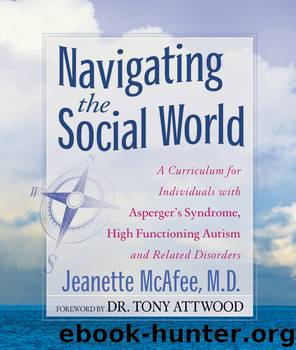Navigating the Social World with Aspergers (with Tony Attwood) by Jeanette McAfee

Author:Jeanette McAfee
Language: eng
Format: mobi
ISBN: 9781935274469
Publisher: BookBaby
Published: 2010-09-14T22:00:00+00:00
PROGRAM 16
OFFERING AND ASKING FOR HELP
INTRODUCTION
Many individuals with AS/HFA have trouble asking for or offering help. The autism literature is full of accounts of both children and adults who have endured on-going frustration over an assignment at school or even physical pain simply because they did not know how to ask for help. One speech and language pathologist described the case of a child with Asperger’s Syndrome who died from burns after failing to call out for help during a fire.32 More commonly, many of these children sit in silent confusion or display undesirable behaviors when faced with a task they do not understand.
In contrast, other individuals with AS/HFA have the persistent belief that they are right, no matter what the situation and in spite of how little they actually know about the subject at hand. This may be due in part to the fact that many people with AS/HFA have spent the majority of their time in solitary pursuits and thus have learned to rely solely on their own judgment when solving problems. In addition, rigidity in thinking and difficulty understanding another’s point of view, both hallmarks of AS/HFA, often make it even more difficult for them to understand that the other person may have a better approach to solving a particular problem.
As with asking for help, offering help can be quite challenging to people with AS/HFA. It is not uncommon for a student with AS/HFA to walk right by another student who is injured, or ignore the classmate sitting next to him who could use his help with a math problem. In cases like this, the student is missing both the opportunity to make a friend and the inherent pleasure of helping another person. Other individuals with AS/HFA may “barge into” a task someone else is working on, without first asking if they can help. This can become a rather annoying habit, even when the intention was simply to be helpful. For all of these reasons, it is imperative to ascertain the individual’s skill level in offering and asking for help, and to teach these skills if necessary.
Steven, a fourteen-year-old boy with AS, was intrigued with anything mechanical. He prided himself on his knowledge in this area, and enjoyed helping people fix things or put things together. He actually could be quite helpful because of his mechanical know-how. The problem was that he did not understand how to offer help and then wait for a response before doing so. Instead, the minute he spotted someone having trouble, for instance, with a piece of camera equipment or a broken bicycle, he would walk right over, elbow the unsuspecting person out of the way, grab the nearest tool and go to work without a “by your leave.” As one might imagine, Steven’s honest efforts to help often earned him an angry rebuff, instead of the appreciation he was seeking. This was unfortunate because in spite of his mechanical ability, Steven was missing many opportunities to experience the joy of helping and the boost to his self-esteem that this would have provided.
Download
This site does not store any files on its server. We only index and link to content provided by other sites. Please contact the content providers to delete copyright contents if any and email us, we'll remove relevant links or contents immediately.
| Behavioral Disorders | Communicative Disorders |
| Gifted Students | Inclusive Education |
| Learning Disabled | Mentally Disabled |
| Physically Disabled |
The Art of Coaching Workbook by Elena Aguilar(51160)
Trainspotting by Irvine Welsh(21643)
Twilight of the Idols With the Antichrist and Ecce Homo by Friedrich Nietzsche(18622)
Fangirl by Rainbow Rowell(9228)
Periodization Training for Sports by Tudor Bompa(8253)
Change Your Questions, Change Your Life by Marilee Adams(7758)
This Is How You Lose Her by Junot Diaz(6877)
Asking the Right Questions: A Guide to Critical Thinking by M. Neil Browne & Stuart M. Keeley(5757)
Grit by Angela Duckworth(5604)
Red Sparrow by Jason Matthews(5466)
Paper Towns by Green John(5177)
Room 212 by Kate Stewart(5105)
Ken Follett - World without end by Ken Follett(4723)
Housekeeping by Marilynne Robinson(4436)
The Sports Rules Book by Human Kinetics(4379)
Papillon (English) by Henri Charrière(4262)
Double Down (Diary of a Wimpy Kid Book 11) by Jeff Kinney(4261)
The Motorcycle Diaries by Ernesto Che Guevara(4089)
Exercise Technique Manual for Resistance Training by National Strength & Conditioning Association(4061)
